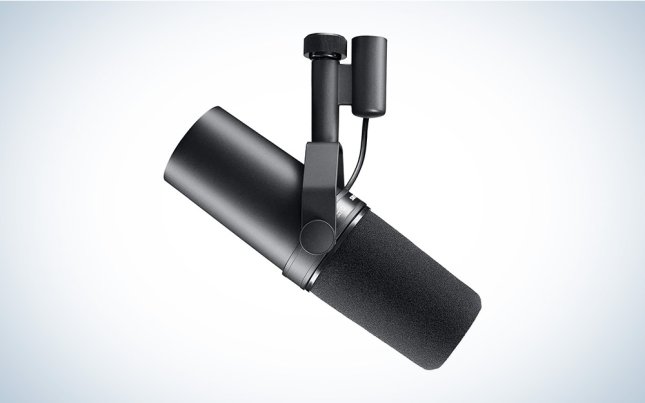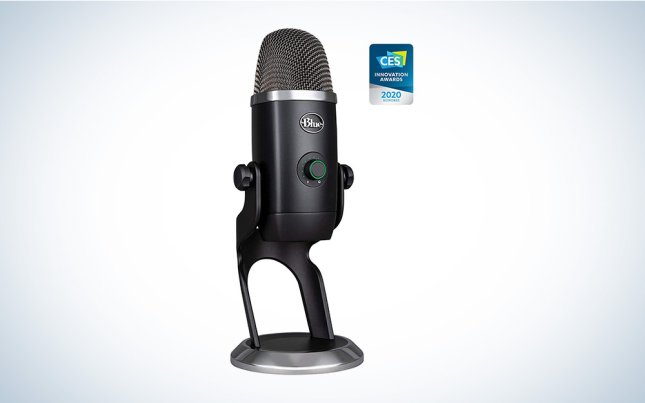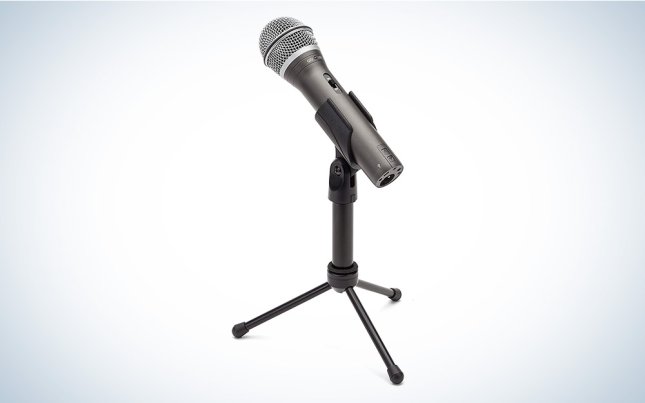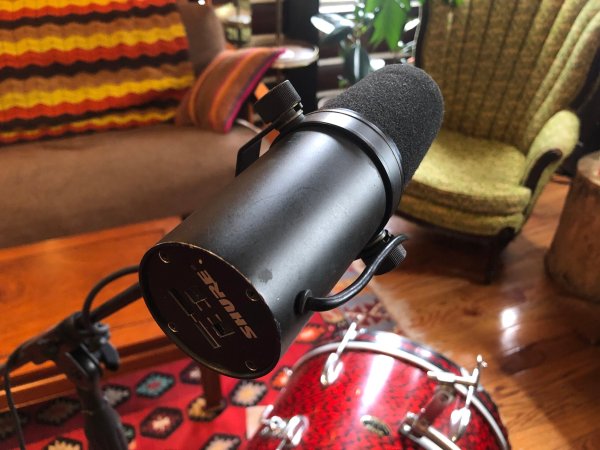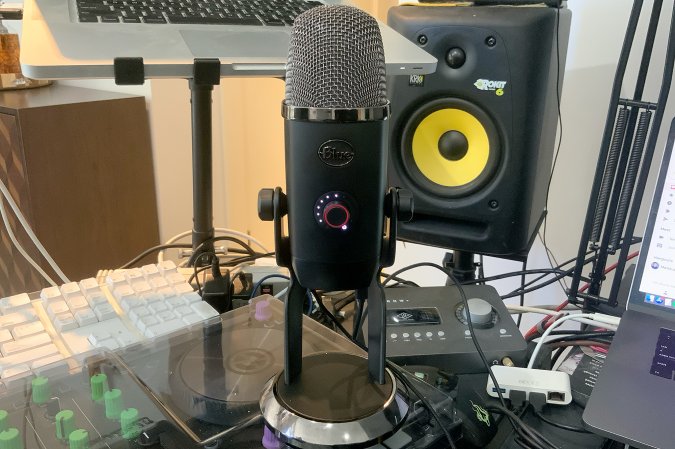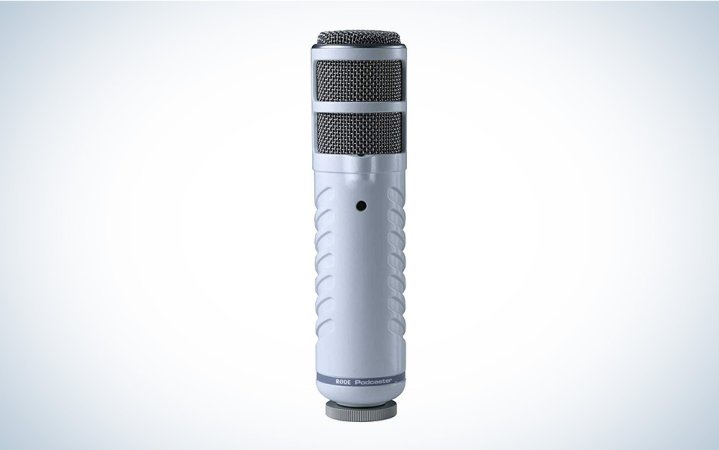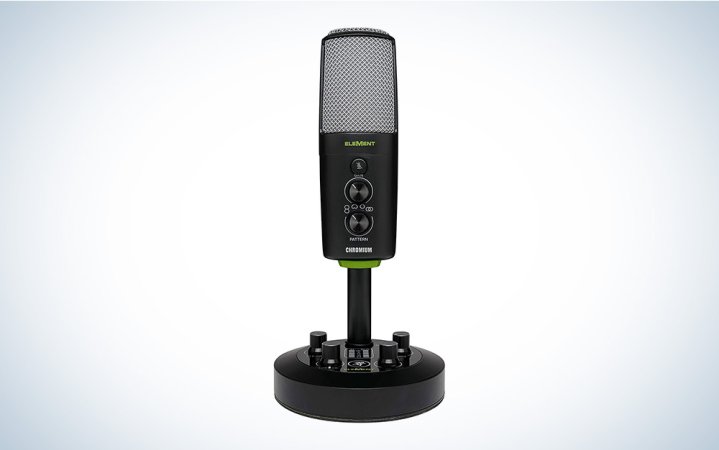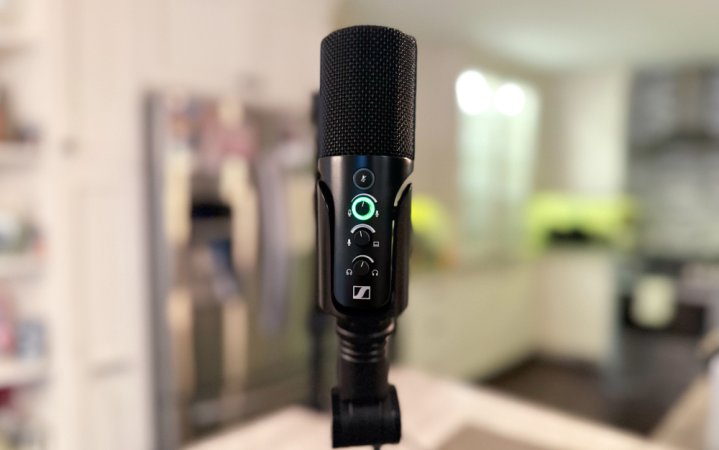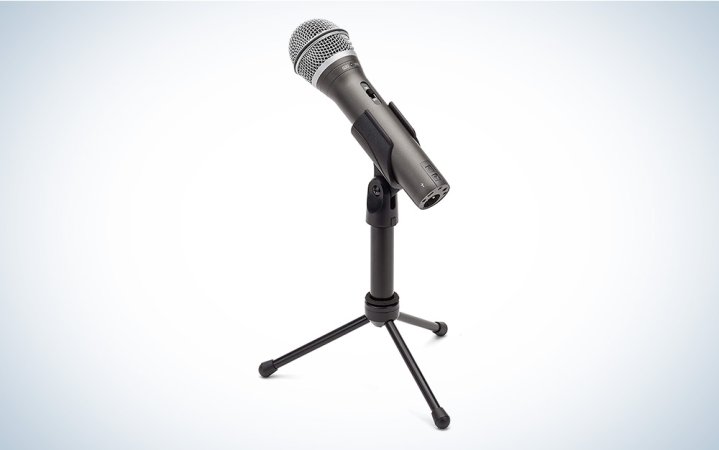We may earn revenue from the products available on this page and participate in affiliate programs. Learn more ›
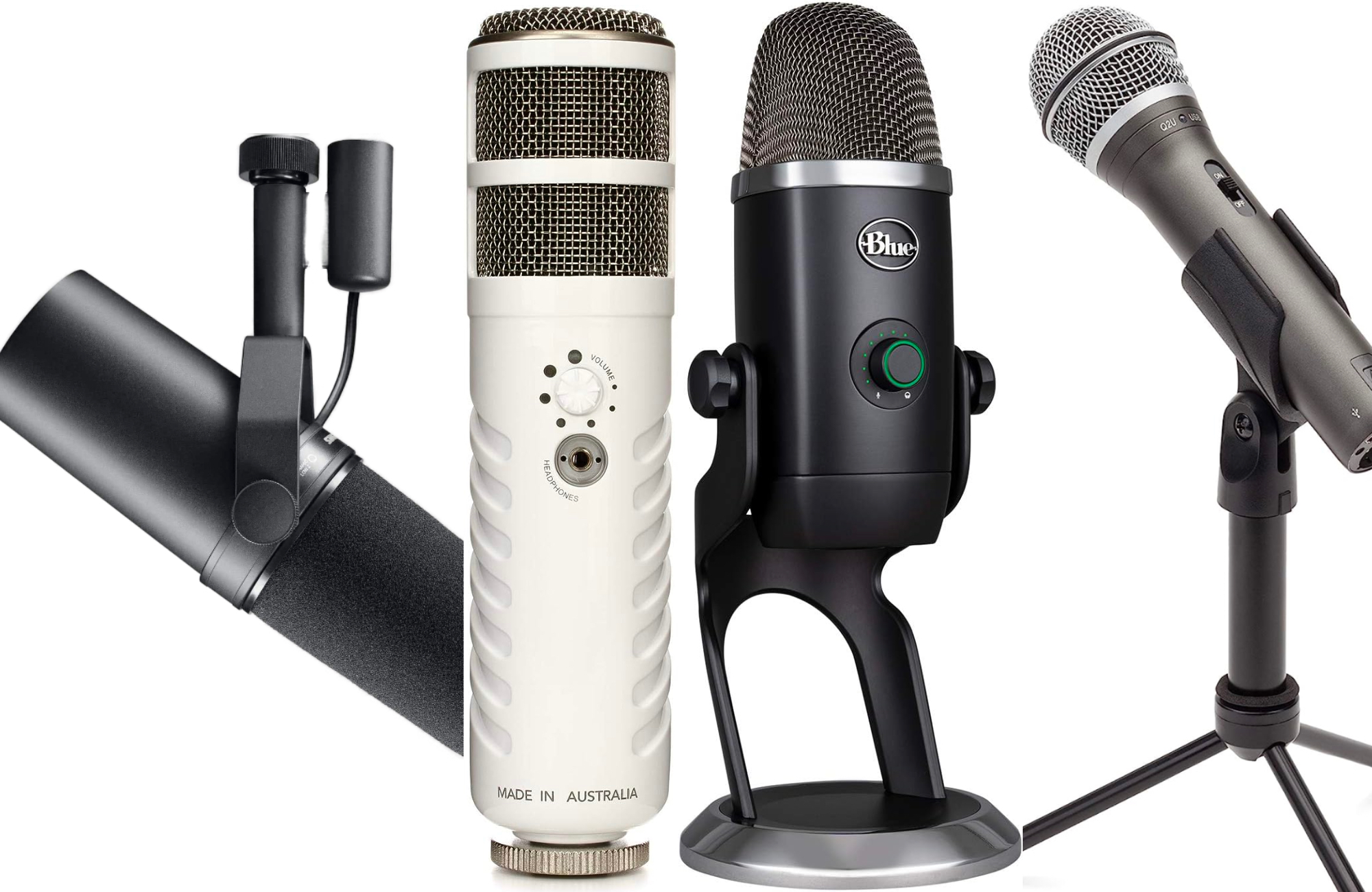
If you’re reading this, you’re likely thinking about starting a podcast, which means you’re going to need a podcast microphone. Well, it seems even those who aren’t reading this are starting a podcast, too! So many people have taken up the habit that a dizzying array of microphones is aimed at the pursuit. Many manufacturers would like you to believe they make the best mic for podcasting, so knowing exactly what to look for will help you cut through the hype. The good news is there’s bound to be something just right for you. Whether you’re starting out or trading up, this collection of the best podcast microphones has the gear to suit anyone’s needs.
- Best overall: Shure SM7B
- Best for versatility: Blue Microphones Yeti X
- Best for voice recordings: Rode Podcaster
- Best for music recording: Mackie EM-Chromium
- Best podcast microphone bundle: Sennheiser Professional Profile USB Microphone Streaming Set
- Best budget: Samson Q2U
How we chose the best podcast microphones
Our recommendations on the best podcast microphones are based on a mix of hands-on testing and research. Some of the factors we considered most strongly include ease of setup and use, the number of podcast participants sharing a microphone, and whether audio editing software was included.
The best podcast microphones: Reviews & Recommendations
Along with the explosive growth in podcasting and livestreaming, the microphone market has kept pace with many dozens of models targeting podcasters or broadcasters in general. Some are part of the recent upsurge, while others have been around for decades. Given all the considerations individual podcasters have to make, this list of best podcast microphones has something for everyone.
Best overall: Shure SM7B
The Vocal Sure Shot
Pros
- On-microphone EQ switch
- Designed specifically for vocal clarity
- Pop filter is included
Cons
- Price
Specs
- Connector: XLR
- Microphone type: Dynamic
- Price: $399
Descended from the 1973 SM7 broadcasting mic, the Shure SM7B has become one of the most popular and recognizable microphones for podcasting due to its expert handling of the human voice. Its low-frequency cut and “presence boost” controls help you dial in the right sound for voices ranging from a rich, understated baritone to an explosive and bright shout-talker. The SM7B zeros in tightly on the voice in front of it, shutting out intrusive background noises. In our review of the microphone, we noted that the microphone’s durability, reliability, and sonic excellence made it a great all-around choice for musicians and podcasters alike.
A versatile microphone that is also used frequently in music for vocals and instruments, the SM7B connects with an XLR cable and can handle up to 180dB of input signal, so you don’t have to worry about shouting too loud during impassioned rants or gaming flame-wars. An internal pop-filter, electromagnetic shielding, and shock-mount technology eliminate unwanted noises from light vibrations and mic contact, electronic interference, and plosive breath sounds.
After conducting hands-on testing, our reviewer concluded that “whether you’re building a pro studio mic collection or just looking for a single microphone to use for streaming, podcasting, and voiceover use, the pure staying power of the Shure SM7B should earn it a spot near the top of your list.” It’s not the only microphone Shure makes that can work for podcasters, and there are challengers to the throne, but the SM7B remains an icon justifiably.
Best for versatility: Blue Microphones Yeti X
X Marks All Spots
Pros
- Won’t distort when recording loud sounds
- On-mic volume controls
- Customizable LED lights
Cons
- May pick up unwanted softer sounds
Specs
- Connector: USB
- Microphone type: Condenser
- Price: $139.13
The upgrade to Blue Microphones’ best-selling Yeti USB mic, the $149 Yeti X has the same four audio-capture patterns as the standard Yeti but delivers a more focused sound and 24-bit/48kHz audio quality for enhanced clarity. It sounds great for spoken word, as well as for singing or recording instruments. The mic is highly sensitive to quiet noises, yet also takes loud levels up to 122 dB.
It’s sleeker and shinier than the older model, and a handy LED ring around the multifunction encoder/mute button shows the levels for the built-in headphone output and the mic input, so you can see right away if your levels are too hot. When paired with the included Logitech G Hub desktop software, you can customize the LED colors and apply “Blue VO!CE” EQ settings for treating your voice with different broadcast presets. Impressively versatile, the Yeti X is a podcast mic for nearly any situation and one of several excellent Blue Microphones options.
Best for voice recordings: Rode Podcaster
Mic to Mouth Resuscitation
Pros
- Designed specifically for podcasters
- Built-in pop and low-cut filters
- Small size
Cons
- Price
Specs
- Connector: USB
- Microphone type: Dynamic
- Price: $229
Of the many Rode microphones suitable for podcasting, the Podcaster dynamic microphone offers a sweet spot that combines excellent broadcast vocal quality, the convenience of USB connectivity, and a road-worthy build for stress-free portability. The Podcaster shares the studio-quality vocal sound of its sibling Rode Procaster XLR mic. It’s specifically tailored for crisp dialog with low distortion and noise and has a built-in pop filter and low-cut filter. Headphone output with volume control gives you zero-latency monitoring.
With a singular focus on picking up the voice at its end and excluding surrounding noise, the Podcaster is a great option for someone who wants set-it-and-forget-it convenience combined with broadcast-level voice capture. (If your start-up capital is stretched a little thin but you do have an XLR-equipped interface, Rode Microphones also makes a $99 PodMic.)
Best for music recording: Mackie EM-Chromium
Music to Listener’s Ears
Pros
- Integrated headphone jack for real-time monitoring
- Audio controls on its base
- 1/4-input for instrument recording
Cons
- May look cluttered
Specs
- Connector: USB
- Microphone type: Condenser
- Price: $149.99
If you host a musical podcast or are a musician yourself, the Mackie EM-Chromium USB-C microphone includes an extra 1/4-inch input for plugging in an instrument like a guitar or keyboard to record along with the microphone. An Aux input lets you play along to music from a mobile device or another source, and you can listen to it all from the headphone output. LED level meters and level controls for the microphone, instrument, headphones, and Aux input are built right into the base of the mic stand.
If you’re playing solo or are interviewing a singer/songwriter, for example, the mic’s Pattern switch selects the proper recording mode for the scenario. Proprietary circuitry borrowed from Mackie’s professional studio and live sound mixers imparts a signature low-noise tone at 16-bit/48kHz audio resolution. You also get an audio recording software suite, including the Avid Pro Tools First.
Best podcast microphone bundle: Sennheiser Professional Profile USB Microphone Streaming Set
Modern Tech, Vintage Looks
Pros
- Comes with a monitor arm
- Built-in volume control and monitoring
- Mute button
Cons
- Price
Specs
- Connector: USB
- Microphone type: Dynamic
- Price: $199
If the thought of finding all the right podcasting equipment has you reconsidering whether you should even start your show, Sennheiser’s Professional Profile USB Microphone Streaming Set is the solution. The bundle, which we were able to review earlier this year, includes a Sennheiser Profile Mic, flexible boom arm, USB-C cable, and mic pouch. The microphone itself sounds excellent and was able to capture our reviewer’s baritone voice without distortion. During tests conducted during Zoom meetings, it was easy for other participants to differentiate between Sennheiser’s microphones and the ones built into a MacBook Pro—which Apple calls studio quality. Knobs on the microphone made it easy to adjust the microphone’s gain (recording volume) and headphone volume.
The microphone’s slim profile made it easy to store and move from place to place, which is helpful for offsite recordings, and Sennheiser’s pouch ensured it wouldn’t get dinged up or dusty. The highlight of this bundle—besides the microphone, of course—is Sennheiser’s boom arm. The flexible arm allowed us to move our microphone to the exact position we wanted. This is crucial during podcasts because mic placement can have a huge impact on both the volume and overall quality of your voice. You always want to be speaking directly into the microphone with your mouth a few inches away to avoid popping sounds and other unwanted audio artifacts. Using the included boom arm let us find the perfect spot for recording quality and comfort.
Getting a perfectly balanced recording setup can be daunting if you’re new to audio recording, but Sennheiser’s Professional Profile USB Microphone Streaming Set does all the heavy lifting for you. Podcast newbies and seasoned ones looking to upgrade from a more amateurish setup should seriously consider this all-in-one solution.
Best budget: Samson Q2U
Package Deal
Pros
- Multiple connectivity options
- Comes with a clip and stand
- Volume can be adjusted on-mic
Cons
- Sound may not be as rich as on higher-end models.
Specs
- Connector: XLR. USB
- Microphone type: Dynamic
- Price: $69.99
If you’re starting a podcast on a shoestring budget, don’t worry. The Samson Q2U will improve the sound of your voice over the internal mic of your computer or mobile device and includes a lot of extras to get you started for a low price. The Q2U has the looks of a classic dynamic vocal mic and is available in an inexpensive podcasting pack that includes a handy desktop tripod stand with a detachable mic clip that screws into standard microphone stands and boom arms. It has both USB and XLR connections with included cables for both, and you can record from both outputs simultaneously.
The Q2U includes a headphone output with volume controls so you can monitor your sound, and there’s a mic On/Off switch. With the final inclusion of a mic windscreen, the Q2U packs the hardest punch for the price. And when it comes to approachable options, Samson isn’t restricting itself to starter kits. The company also offers the $199 Q9U—read our full review here—an alternative to the aforementioned Shure SM7B at $200 less.
What to consider when shopping for the best podcast microphones
There is no single “best mic for podcasting” for everyone’s needs, but there are plenty of types and models of microphone choices for you to experiment with to find the perfect one for you.
Do you want a plug-and-play mic?
For the easiest podcast setup, USB microphones offer a direct connection to your computer and often to mobile devices as well. Many popular, professional podcasting mics use an XLR connection instead, for which you would need an additional mixer or audio interface to connect to a computer. That adds another layer of cost and complexity if you’re not already familiar with that equipment. However, some microphones offer both USB and XLR connections, making them more versatile.
Do you have the budget for the highest quality?
Most, if not all, of the many podcast mics available will noticeably improve the quality and clarity of audio as compared to the built-in mic on a computer or mobile device. However, microphones for recording span a considerable price range. If you just have to get the professional-looking XLR broadcast mic that your favorite YouTuber uses, or if you want to make sure your USB mic has the highest possible digital audio resolution, the associated costs vary.
How important are its looks?
If you’re planning an audio-only podcast, feel free to show up unshowered in your favorite pair of unkempt, soft pants. And the microphone can look shabby, too. But for video, sometimes the best YouTube microphone is the one that looks the most stylish, the most professional, or the most modern, depending on your show. There are some microphones on the market that offer flashy and/or unique looks but may not measure up in terms of audio fidelity and other features. Take all your needs into consideration, and you should still be able to find something that will look cool for the ’Gram.
How many people will use the mic at the same time?
There are some wonderful and popular podcast mics that are designed specifically for a single person talking directly into the mic. These use what is called a “cardioid” pickup pattern. If, however, you need to record two or more people sitting in front of the mic, sitting across from each other, or spaced all around a room, you should look for a mic with multiple pickup patterns. There are many such microphone options, and they let you switch the pattern to be best for your current situation.
Do you need audio software included?
If you don’t have any audio recording software yet, the ever-popular free Audacity program, GarageBand for macOS/iOS users, or any number of free or paid web apps and software downloads could accommodate you. On the other hand, some podcast mics come bundled with sophisticated and powerful audio editing and/or music production software that will go beyond what you find in open-source options like Audacity. These bundled programs are usually limited-feature versions of professional digital audio workstation (DAW) software. However, they can still give you all the multitrack editing and production features you are likely to need for your podcast.
Related: Recording a podcast at home? You’ll need more than a mic.
FAQs
Just like other popular podcasts—such as Pod Save America, Conan O’Brien Needs a Friend, and 99% Invisible—The Joe Rogan Experience podcast uses the Shure SM7B mic. Clearly visible in Joe Rogan’s Spotify podcast videos, the SM7B has also been popular for recording singers and instruments, in addition to Twitch and YouTube game streamers.
Even if you are going to have more than one person on a podcast, you do not always need two mics for a podcast. Many microphones for podcasting offer different settings called pickup patterns or polar patterns, which record the sound in different areas, such as in front, in front and in back, in all directions surrounding the mic, and so on. With such settings, you can use a single microphone to record two people sitting across from each other, next to each other, or a group of people in a room. However, providing a mic for each person on a podcast may help in getting similar audio levels from each person and allowing each person to sit more comfortably.
This depends on its connector(s), materials, and, most critically, its internal audio components. Our recommendations range between roughly $70 to over $200. Be mindful that you will also need to invest in an audio interface if you choose to use an XLR microphone.
Related: Check out PopSci’s Weirdest Thing I Learned This Week Podcast Here
Final thoughts on choosing the best podcast microphones
- Best overall: Shure SM7B
- Best for versatility: Blue Microphones Yeti X
- Best for voice recordings: Rode Podcaster
- Best for music recording: Mackie EM-Chromium
- Best podcast microphone bundle: Sennheiser Professional Profile USB Microphone Streaming Set
- Best budget: Samson Q2U
Thankfully, starting a podcast does not require a huge investment, but it can only help to have a good microphone. And narrowing down the crowded field to your own best mic for podcasting depends on your priorities. Can you afford to spring for the professional broadcast standard, or do you need to keep it frugal? Do you want the convenience of a direct digital connection with a USB microphone? Is it a Twitch or YouTube microphone, and the outward appearance is important to you? Taking a little time to weigh the available options against your needs will yield the best podcast mic so you can stop shopping and start talking.
